Over the past two days, Socialist Appeal supporters and Marxist students in universities across the country have been offering their support and solidarity to lecturers and higher education staff involved in the national UCU strike over pay. We provide here a number of reports and pictures highlighting the militant mood of those on strike and the involvement of the Marxist Student Federation.
Over the past two days, Socialist Appeal supporters and Marxist students in universities across the country have been offering their support and solidarity to lecturers and higher education staff involved in the national UCU strike over pay. We provide here a number of reports and pictures highlighting the militant mood of those on strike and the involvement of the Marxist Student Federation.
In Southampton, the Soton Marxist Society visited the picket line to offer their solidarity and wrote this excellent piece for the Wessex Scene student newspaper urging Southampton University students to support the lecturers’ strike. The Marxist societies at Newcastle University and Glasgow University were also out on their respective picket lines in full force, supporting UCU members in the strike action.
At Queen Mary University of London (QMUL), Marxist students linked up with the local UCU branch to help them publicise this letter to QMUL students, which provides a very clear and useful explanation of what the strike is about and why students should support it.
The comrades at University College London sent in this report:
The UCLU Marxist Society attended the picket line at UCL on Wednesday to show solidarity to striking staff. We were very impressed with the turnout and the mood among those we found there, which were comparable to picket lines in the strikes two years ago that had also involved Unite and Unison members on campus.
Speaking to some of the staff, there was a sense that this time around the strike was part of a wider fightback against austerity – one union rep called it a “political strike” – propelled by the recent junior doctors’ struggle and the green light given to strikes by the Labour Party leadership for the first time in history. However, there was also scepticism of the tactics of the union leadership in this particular case – choosing to strike so late in the academic year – and a feeling that the leaders of the general unions were dragging their feet and had cost the strike by not balloting their own members working at universities.
One of the strikers expressed solidarity with the hundreds of students currently involved in the UCL rent strike, said that they had the full support of the UCU branch on campus, and encouraged them to come down to the picket line of the next strike to strengthen the cause of their lecturers.
All in all, a buoyant atmosphere on the picket line and a morning well spent!
See below for extended reports from UCU members and Socialist Appeal supporters at Queen Margaret University, Kings College London, and London Metropolitan University.
Marxist Student Federation members, meanwhile, also produced this handy infographic, which vividly shows the injustice and inequality surrounding pay in universities, with management continuing to pay themselves eye-watering salaries, whilst staff are forced into strike action to win a fair pay deal.
Darrall Cozens, a retired UCU member in Coventry, gave this report from the picket line at Coventry University:
Excellent mood on the UCU HE picket line today at Coventry University. Picket numbers up on previous disputes. Anger visible, as is determination to win. An almost 15% drop in real wages since 2008 while the Vice Chancellor pockets more than £303,000 has added fuel to the fire.
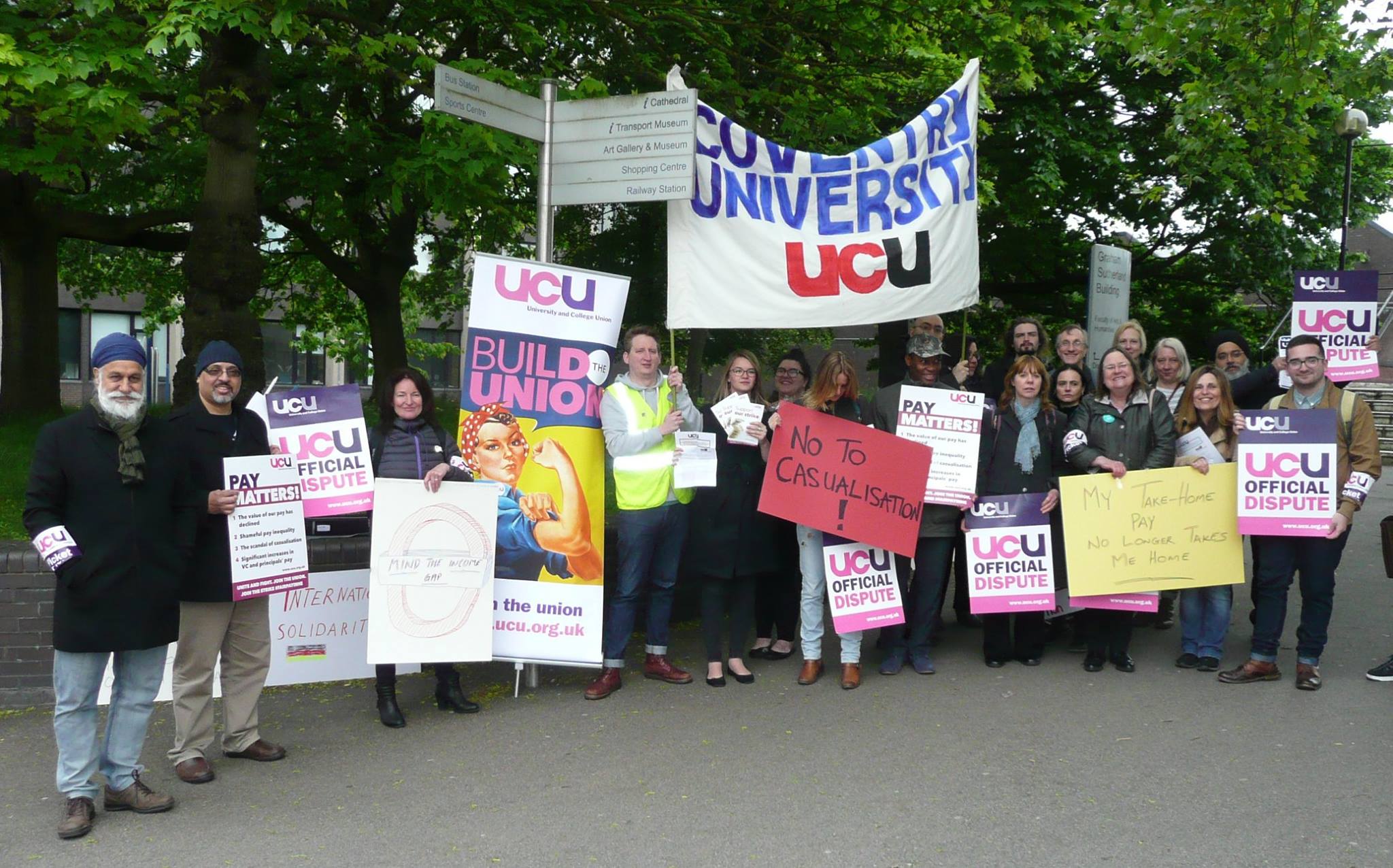 Coventry University picket line
Coventry University picket line
 Southampton University UCU picket
Southampton University UCU picket
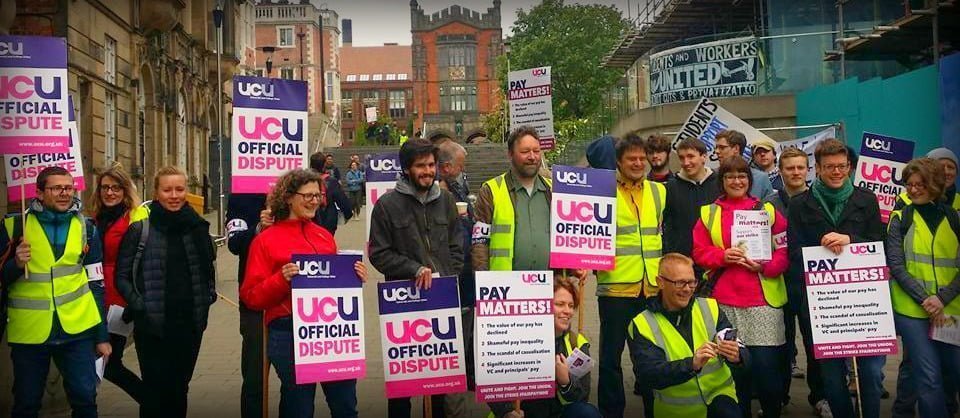 Newcastle Marxist society at the Newcastle University picket line
Newcastle Marxist society at the Newcastle University picket line
Edinburgh
Ross Walker, a UCU member at Queen Margaret University (QMU) in Edinburgh, provided this report from his university:
We had about 10 out on the picket lines on both days. The workplace has around 500 staff, and 101 are UCU members. The QMU Students Union president joined us on both days, and so did a Palestinian student who is studying here due to an exchange programme initiated through UCU campaigning.
It was outside of term time so not many students were around, though it did coincide with marking, which would affect the students. We made it clear that we are requesting that all money from unpaid strike days be given to the student hardship fund in order to win student support. If the uni doesn’t do this we will call them out on it in front of our membership and the SU.
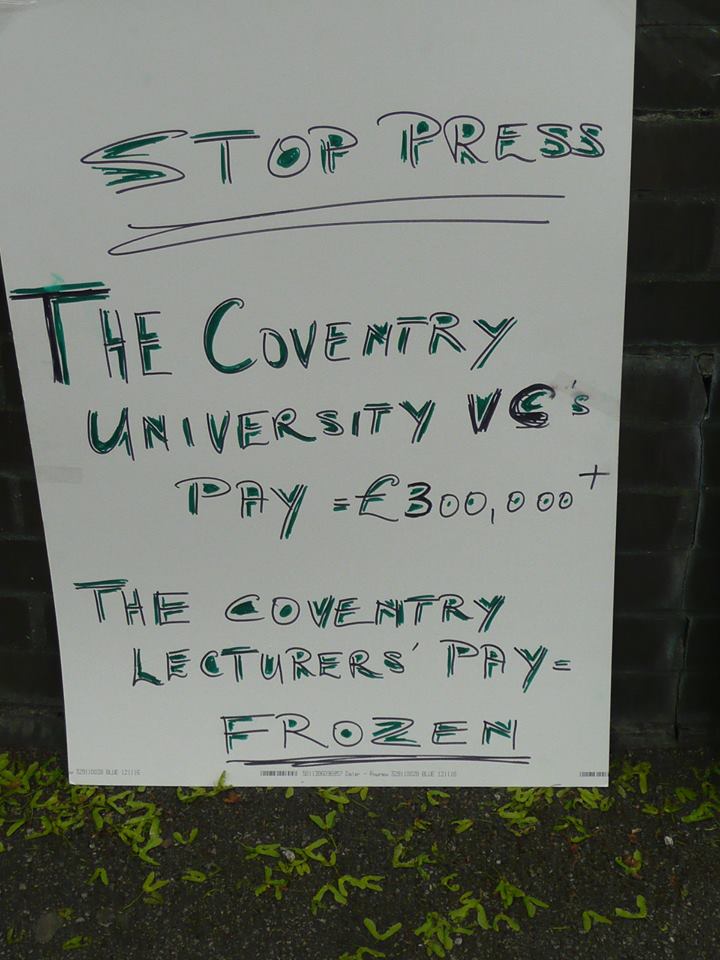 Unfortunately a lot of people crossed the picket line, including UCU members, some of whom had used the union facilities in the past. Many cited that they were busy, were happy with their pay and didn’t vote for this strike. Picketers argued against this ardently but patiently, but could not extend our picket by more than ten. This is of course frustrating, but we as Marxists take a long and optimistic view. Big events are on the horizon which will shape and mould the consciousness of workers and those who cross the picket line today will realise the need to fight back in the not so long future.
Unfortunately a lot of people crossed the picket line, including UCU members, some of whom had used the union facilities in the past. Many cited that they were busy, were happy with their pay and didn’t vote for this strike. Picketers argued against this ardently but patiently, but could not extend our picket by more than ten. This is of course frustrating, but we as Marxists take a long and optimistic view. Big events are on the horizon which will shape and mould the consciousness of workers and those who cross the picket line today will realise the need to fight back in the not so long future.
The trade unions must also take responsibility for this. When recruiting members, activists have a duty to also educate new members in the need for them to strike when called on to do so. Many workers stated that they had relatively good working conditions and pay. This is true compared to some areas, but of course is only because trade unions exist and are constantly campaigning against low pay, casualisation, overwork and defending members against bullying management, sexual harassment, unfair disciplinaries, attempted redundancies etc. Often the confidential nature of this makes it difficult to publicise and hence trade unionists undersell themselves, whilst workers take their modest, relatively good conditions for granted. Trade unions should work on developing the consciousness of their members.
Unified action with the other three unions at QMU would also have been much more convincing. Despite the shortfalls, the picket was actually in good spirit. EIS members who weren’t on strike went in and bought us coffees. Unison and Unite reps wrote messages of support on the blackboard and stood with us until they had to go in at 9am. One of the reps who belongs to a cyclist club had cyclists come along and deliver us cakes. I led chants on the megaphone and described how we had only got 1.1% whilst the principle had received a 13% pay rise…just as the principle showed up! (There goes any promotions for me.)
Kings College
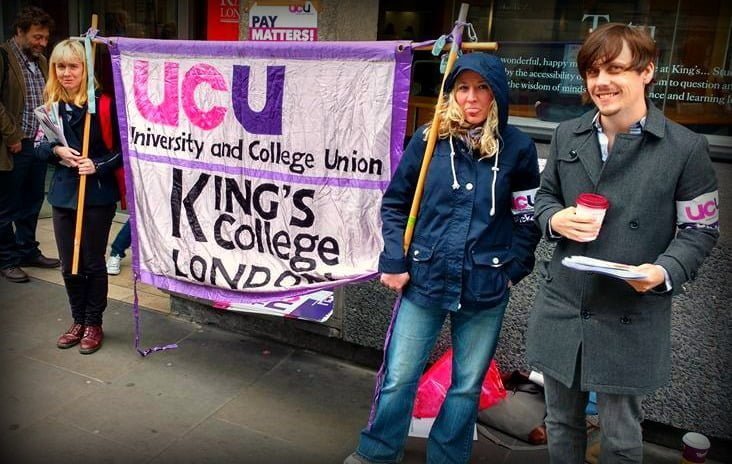 The strikers at the picket line at King’s College London are striking about far more than the measly 1.1% pay offer from UCEA and the government. A member of the History faculty holding up the UCU banner told me that she is not paid well, but for her the strike was about far more than that. Her motivation for participating in this strike is that she is sick of the commercialisation and corporatisation of the entire education system and public sector in general.
The strikers at the picket line at King’s College London are striking about far more than the measly 1.1% pay offer from UCEA and the government. A member of the History faculty holding up the UCU banner told me that she is not paid well, but for her the strike was about far more than that. Her motivation for participating in this strike is that she is sick of the commercialisation and corporatisation of the entire education system and public sector in general.
“Vice Presidents and Vice Chancellors do nothing! They have to answer to no one but are constantly examining staff for performance. It is like a dictatorship you would expect in Sports Direct or somewhere, and it’s extremely alienating. New staff just get seven month contacts – the length of term time – so you can’t do research only teaching. There is a huge move to casualisation and super exploited staff, besides which the university will have a couple of academic ‘superstars’ absurdly overpaid.” It hasn’t escaped the notice of staff that LSE, just up the road from here, has just appointed Angelina Jolie as a professor a title she earns with only one lecture per year!
Hear Joe Attard, UCU member at KCL and Socialist Appeal supporter, talk about the current national strike of UCU members and the way forward in the fight against austerity and the Tories
Following a successful picket, we headed over to the demonstration outside UCEA HQ in Tavistock Square. Here Joe Attard interviewed Malia Bouattia, the new left wing president of the National Union of Students, about the strike. She said that “in universities around the country management is trying to play students off against staff. They are saying it is ‘unreasonable’ to have a strike in the exam period. But the NUS’ objective is to foster solidarity between the students and staff, because our interests are interrelated. This is the long term strategy for the NUS because both students and staff are going to have to take action again and again to get the education system we want.”
After this demo about 150 packed into Conway Hall to hear several leading members of the UCU and other unions involved in education. Michael MacNeil, UCU national head of bargaining & negotiations, gave an angry speech relating the strike to the broader context of capitalism today, in which the share of wealth going to those who produce it – the working class – has shrunk and shrunk. He correctly said that everyone in the meeting must go back to their branches and build for more militant action to defeat the government. He emphasised the strike is part of building a political alternative to austerity – though he didn’t add what that is!
Joe Attard spoke from the floor, reporting on the huge success of the Fair Pay for GTAs campaign at King’s College. He then added that the political alternative to the waves of austerity and inequality can only be socialism, since capitalism is based on exploitation and will always require exploitation in education. Only under a socialist society can education be free permanently.
The meeting ending on a very militant note as Mark Campbell , a victimised trade unionist from London Metropolitan University, rightly said that the only way to win in this struggle is to throw down the gauntlet to the government. He said it will be a long and hard fight and we must prepare our members for that.
This is absolutely correct and exactly the kind of leadership the whole labour movement needs. Today’s strike was a very good starting point. But local trade unionists need to feel confident that their leadership is prepared to fight. We think it was a mistake to call the strike at a time when few students are coming in to university. The UCU needs to plan its action to have the maximum impact and must encourage its branches to wage a campaign amongst their students and their student union reps that they must show solidarity and strike with them. If we prepare for more action of that kind now, we can stop the government in its tracks.
 Staff and Students say no to casualisation at London Met
Staff and Students say no to casualisation at London Met
By James Kilby
Approximately 100 staff and students gathered outside London Metropolitan University on Holloway Road, to support UCU members on strike, and to protest against casualisation in the education sector.
The demonstration coincided with the second day of strike action by the UCU, which is fighting for an improvement on the paltry 1.1 pay increase being offered by the Universities and Colleges Employers’ Association.
In addition to the struggle for a better pay increase, the UCU is campaigning on two main issues. Firstly, to end the gender pay gap, which sees women in higher education nationally 12.6% worse off than men, but can see disparities of 17 to 27% in specific cases. Secondly, to combat casualisation of staff, who are being increasingly forced onto zero hours contacts. Education is now one of the most casualised sectors outside of catering – at London Met, 51% of the lecturers are on zero hour contracts.
End Zero Hours!
Mark Campbell, Chair of London Met UCU, and Higher Education Chair for the London Region UCU, explained in an interview with Socialist Appeal:
Our argument is that all casualised contracts should be got rid of. That doesn’t mean getting rid of the staff, but means putting them on fractional, permanent contracts, in line with their colleagues. Then we will fight for better terms and conditions for all. That’s what this strike is about.
Solidarity greetings were given to the pickets from representatives from other universities, such as Queen Mary, and City University, in addition to members of other unions such as the NUT and BECTU. They were joined by students from London Met and elsewhere, showing the solidarity of workers and students in struggle.
London Met under attack
This is not the first time staff at London Met have come under attack. In fact, the university has faced cuts going all the way back to its inception in 2004, as a result of the merger of London Guildhall University, and the University of North London. Immediately management sought to obtain “economies of scale”, i.e. cutbacks of staff, and making those left work longer and harder for less pay.
This process has continued, particularly since the crisis of 2008. Since then, university budgets have been slashed, in order to pay for the crisis of the bankers and billionaires. Whole courses and even departments have been lined up for the axe.
The number of full time academics at London Met have been slashed from over 1,200 in 2004, to 380 at the last count, many of whom are casualised. Similar attacks have taken place at universities all across Britain, and indeed the world.
Such attacks, are an inevitable symptom of a system organised only for profit. The trend towards casualisation must be seen in this context. By placing staff on zero hours contacts, the employers can avoid paying the normal benefits associated with full time employees, including holiday and sick pay. Although universities are not run for profit, they are subject to the same laws of the market. A crisis of the market inevitably leads to a crisis of funding for education.
At London Met, the management have placed both Mark Campbell (Chair of London Met UCU), and David Hardman (secretary of London Met UCU) onto compulsory redundancy. This is a clear case of victimisation of trade union activists, in order that the management can impose their cuts with less resistance. Staff and students are determined to fight these attacks, and are campaigning for their full re-instatement, on top of the wider demands of the national strike.
Asked about the next steps for the dispute, Mark stated that,
We are going to generalise the fight, and what we’re trying to do on a more national level is organise. The NUT are balloting, we think that ballot will be easily won. They are talking about coming out in the first week in July. We think it would be a great idea to come out together.
We say, at the end of the day, this is a strike about education, from the cradle to the grave. That’s what we’re about, that’s what we will fight for, and in that sense, everything is political.
The linking up with other education unions is a positive development towards winning this dispute, and shows the way forward. The unions must now go on the offensive, and draw the political conclusions from the struggle. I.e. that to guarantee decent education for all, with staff who are secure in their jobs and well paid, we must break with the system that cares only about the profits of a few billionaires. The fight against casualisation is therefore a fight against capitalism.
- Re-instate Mark Campbell and David Hardman! No to victimisation!
- End the gender pay gap!
- End casualisation. Those on “zero hours” to receive the same terms and conditions of full time staff
- Victory to the strikers!
- For a socialist education policy, funded by expropriating the banks and big business!
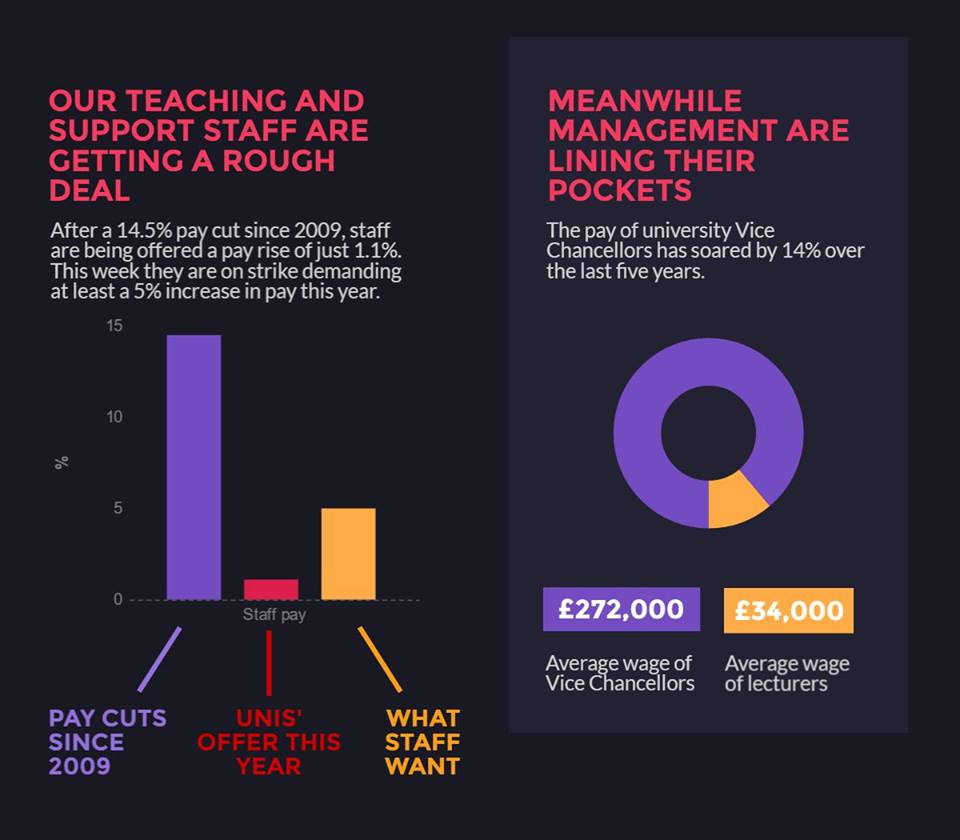

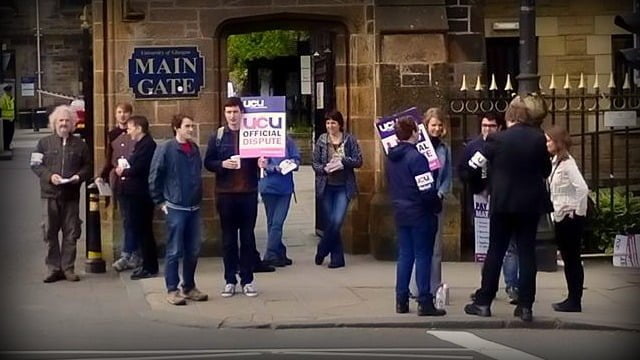

 Staff and Students say no to casualisation at London Met
Staff and Students say no to casualisation at London Met


